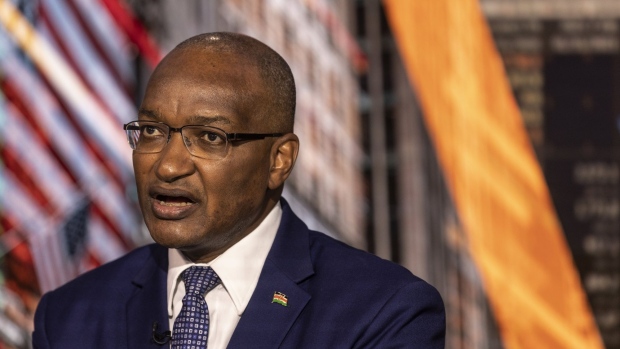Sep 21, 2022
Debt Control Key for Frozen-Out EMs, Kenya Central Banker Says
, Bloomberg News

(Bloomberg) -- Emerging and frontier market nations need to manage their debt better after being priced out of global markets, according to Kenya’s central bank governor.
“Financial markets have frozen us out and it is difficult for us to maintain our relationships in the capital markets,” Patrick Njoroge said in an interview with Bloomberg TV. “Things would be tougher for a bit longer and that is a big concern for us.”
Njoroge said he has met policymakers from advanced economies including Federal Reserve Chair Jerome Powell asking them to “consider the spillover” of their actions on emerging markets as they raise borrowing costs. The Fed on Wednesday increased interest rates by 75 basis points for a third straight time and signaled even more aggressive hikes.
Njoroge will lead Kenya’s monetary policy committee meeting next week to review rates in a month inflation is expected to accelerate after a reduction in subsidies pushed up fuel costs. Consumer prices rose 8.5% in August from a year earlier, and have exceeded the central bank’s 7.5% ceiling since June.
For the rate decision, “we will have to look at the data that is before us,” Njoroge said. But “the data is making us optimistic in terms of the final outcome” as it’s expected that the price of oil will come down and corn supplies will improve, he said.
The Kenyan central banker earlier this week told the nation’s lawmakers to find ways of easing the nation’s debt burden while supporting growth, such as funding infrastructure projects with private money.
Interest Costs
The cost of servicing the East African nation’s public debt may jump by a third to a record 1.39 trillion shillings ($11.5 billion) in the fiscal year through June 2023, more than half of projected state revenue, according to budget documents.
Central banks in the US, the UK, and Europe have hiked interest rates in a bid to fend off inflation that’s risen to unprecedented levels partly due the war in Ukraine driving up commodity prices. That’s luring capital away from developing nations and making borrowing costs prohibitive.
Some domestic factors in emerging markets only accelerated the selloff. In Kenya, the worst drought in decades and an initially tense election contributed to a jump in bond yields.
From Sri Lanka to Ghana, nations have been forced to default or restructure their debts this year. Ghana, which has suffered one of the worst sell offs in Africa this year, saw its eurobonds fall to record lows on Wednesday after the government initiated discussions with investors to revamp its obligations.
“The spillover from central banks raising interest rates to combat inflation as been severe beyond border as global investors pull money out of developing economies,” Ghana’s President Nana Akufo-Addo said in a speech at the United Nations General Assembly on Wednesday. “It’s become clear that the international financial structure is skewed significantly against developing and emerging economies like Ghana.”
Kenya, which the International Monetary Fund categorizes as being at a high risk of debt distress, halted a plan to sell eurobonds this year because the yields were too high, and instead started considering bank loans, a move that was also put on hold. Newly sworn-in President William Ruto is yet to release new debt plans, though he ruled out restructuring debt during the campaigns.
“Debt management is something that needs to be taken much more seriously given the narrowing space that we have seen in recent months,” Njoroge said. “See what else we can do on refinancing whatever high interest debt with low interest debt, looking more toward concessional debt.”
(Updates with Kenya’s next rates ecision in fourth paragraph.)
©2022 Bloomberg L.P.






